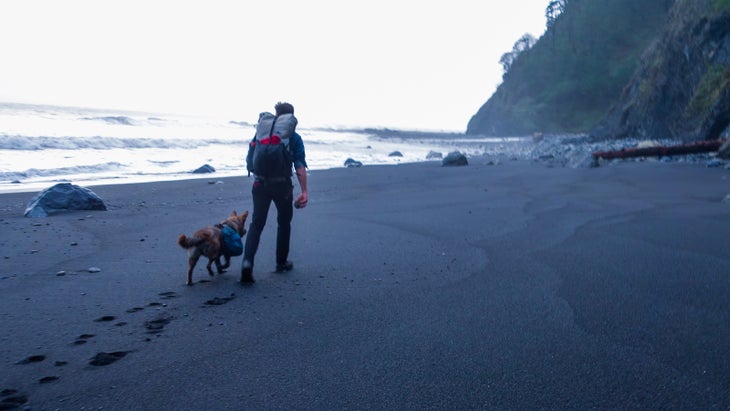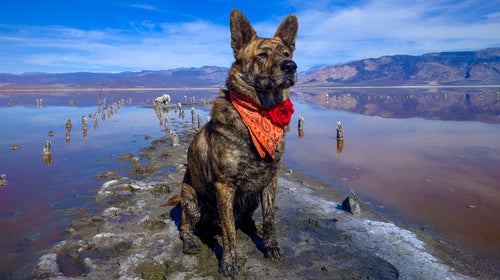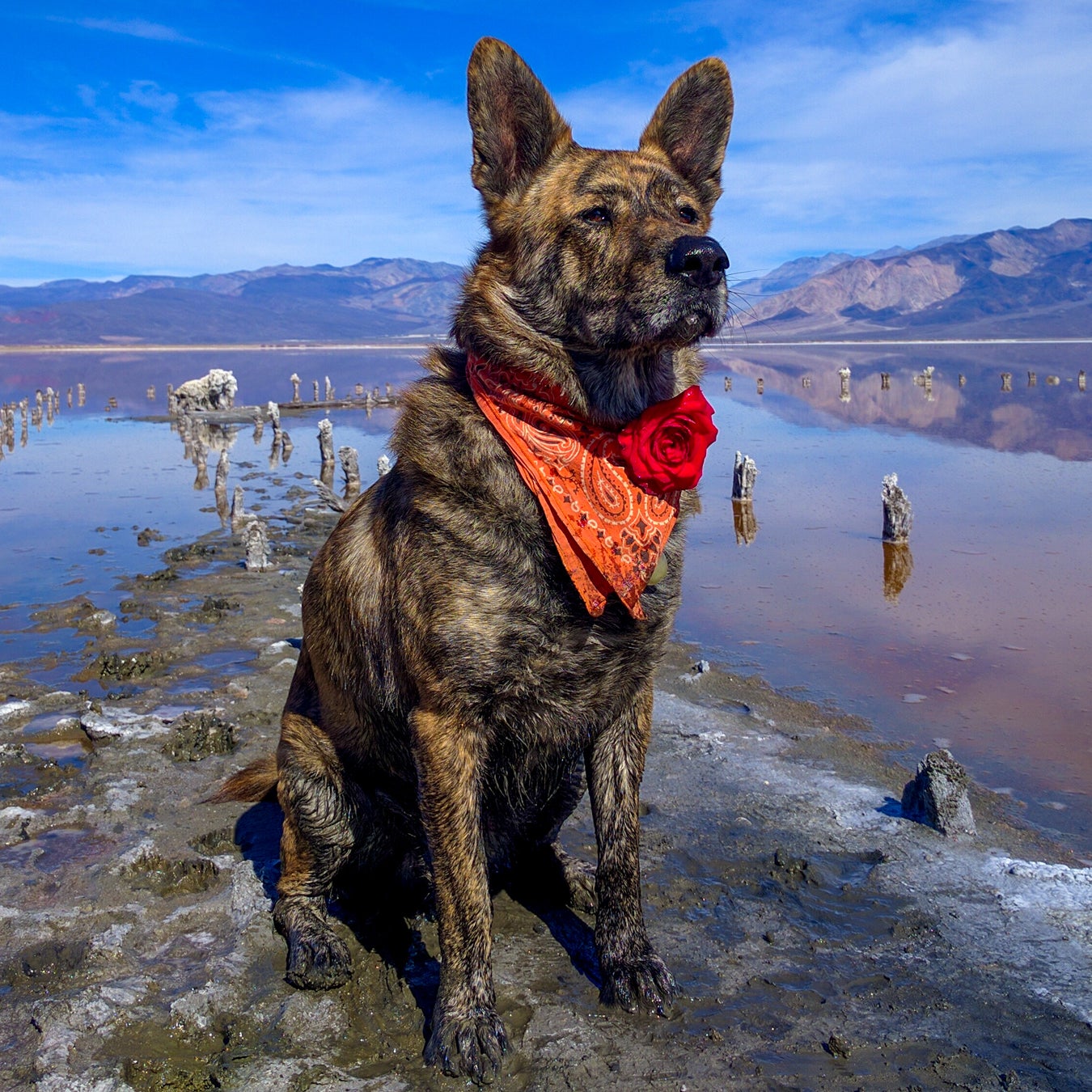I’m a dog person. I’m an outdoors person. So it should come as no surprise that I like to combine the two. And I don’t like to use a leash when I do it. But having Wiley off-leash out in the mountains, desert, or beach regularly leads to problems. Not with him, and not with wild animals, but with people. Heck, simply for being off-leash, and that’s just crazy. So I figured I’d look into the issue and do my best at making the argument why my dog—or any dog, for that matter—belongs off-leash in the outdoors.
Addressing Off-Leash Objections
People seem to have three major reasons for getting upset that Wiley is running free: dogs poop, dogs chase wild animals, and dogs are scary. Let’s look at each and see if they really are issues.
Poop
Everyone poops. Especially dogs. I’m intimately familiar with that fact, not just because I also poop (often outside), but also because I’ve handled virtually every piece of poop that’s ever emerged from my dog’s butt. I use a little plastic baggy to pick up the poop, carry it to a trash can, and throw it away. I know not every dog owner picks up their dog’s poop in public places, or in the outdoors, but that has nothing to do with leashes. We’ll discuss the responsibility inherent with dog ownership a little later. Poop.
Chasing Wild Animals
Yes, dogs do this. If it has fur or feathers, Wiley has run after it. And that’s a good thing, for reasons I’m about to explain. The only things he’s ever actually caught are coyotes and a bear. Let me tell you about that bear, and I think you’ll begin to understand my argument.
Late one night, after nearly getting shot in a road rage incident (the dogs scared off the aggressor), my friend Ty and I pulled into a remote campground way down a dirt road on California’s Lost Coast. It was pouring rain, and we’d just driven for like 14 hours, so instead of hopping right out of the car when we got there, we kicked the dogs out, cracked a couple beers, and decompressed for a few minutes. Pretty much right away, the dogs got into some sort of animal. Wiley and Sansho, Ty’s Karelian bear dog, are tough guys, and you can hear when a dog is winning or losing a fight, so we just left them to it. Odds were it was a skunk, possum, or coyote, or something they’d either dispense with quickly or learn a lesson from. Ten minutes later, as we were on beers number two, it became apparent that whatever the dogs were fighting wasn’t small. We got out of the car. Ty grabbed a stick, and I grabbed a flashlight. He started beating the bush that was shaking, and a big ol’ black bear jumped out, nearly knocked Ty over, and ran off.
That bear had just been tossing the campground for trash. If we didn’t have the dogs with us, we likely wouldn’t have known the bear was there until we’d gone to bed and it came to raid our site. I haven’t had to worry about bears on a camping trip since I adopted Wiley.
You see, by harassing wildlife, dogs actually serve an important function in safeguarding it. Take that bear, for instance. If it was regularly raiding that campground for food, it was already in conflict with humans. That could mean wildlife managers would need to tranquilize the bear and move it to a different area, or, in an extreme case, even kill it. But thanks to that one interaction with our dogs, the bear is now a little more wary of that location. I’m not saying that one interaction fixed the bear’s problem, but that the regular presence of other off-leash dogs like ours would either prevent or possibly even cure behavior that had been habituated by irresponsible human campers.
Yes, this is backed up by research, which I’ll get to, and it is applicable to other, less frightening species. It’s also how states like Washington that have large bear populations living near people . A wild animal that fears humans is going to be a more successful wild animal. Washington’s Department of Fish and Wildlife (WDFW) helps instill that fear in cougars, moose, and bears by harassing them (yes, “harassing” is the technical term) with Karelian bear dogs. And it’s a successful program: 96 percent of the problem bears that were harassed by Karelian bear dogs and released into the wild never again have a human conflict.
Can the same argument be applied to herbivores? WDFW also uses Karelians to harass , training the sheep to stay out of the way of motorists. Back east, whitetail deer represent too large a risk to drivers to be addressed by dogs alone, but I’m sure you can see the upside of having this species stay as wary as possible of humans and their roadways, homes, and gardens.
Does harassment by dogs negatively effect animals? found that instilling a fear of predators, which we humans have largely removed from the natural environment, can be “critically important” to restoring natural order to the food chain. It alters the behavior of every animal beneath that predator. We know that the impacts of even a relatively small number of apex predators can have a cascading effect across the entire ecosystem. That’s . Should we think any differently about the effects dogs have just because they also like snuggles? They are, after all, the same species as wolves.
Dogs Are Scary
Let’s get this straight from the beginning. Off-leash dogs do not represent a statistically significant threat to you outdoors. In fact, , and the vast majority of victims know the dog that bites them. You are more at risk of a dog bite at home than you are hanging out in the woods. Dogs are also less likely to be aggressive off-leash than they are on one. (I’m getting to that.)
I understand that phobias are a thing and some people have had negative experiences with dogs, which leads to fears. But an under-control off-leash dog is no more likely to cause you harm than a leashed dog. And I’d also argue that addressing your fears, rather than succumbing to them, . There are . You will encounter them regularly.
Dogs have been our companions for something approaching 20,000 years. They helped us conquer the planet and build modern civilization. They evolved specifically to become our friends and live in symbioses with homo sapiens. That’s you, even if you think they’re scary.
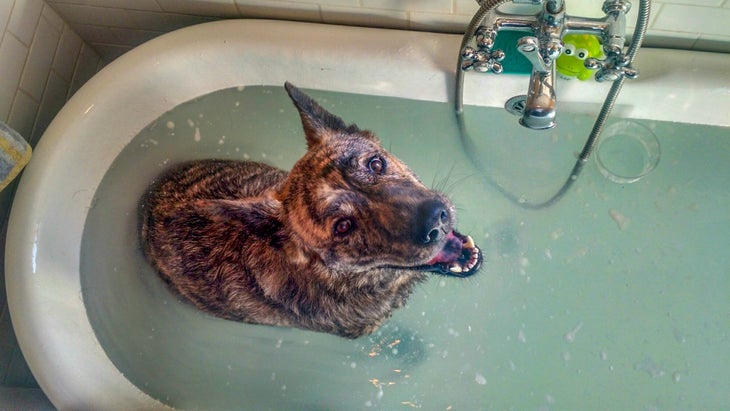
The Model for Canine Good Citizenship
Does there exist, anywhere within a similar society, a model that demonstrates the positive benefits of dogs going off-leash? I’ve never been there, but my editors suggested that the Boulder, Colorado–based , which grants dog owners an off-leash license if they and their dogs demonstrate a certain level of competence and good behavior. There is in Rockville, Maryland.
Both programs require owners and dogs to demonstrate basic command and obedience abilities, like recall, sitting, and staying, and doing all that in the presence of distractions. It’s pretty basic, and it’s stuff that Wiley and I, and probably any other half-competent dog owner and dog, could easily pass. The American Kennel Club has a much more advanced certification. It seems like common sense that you and your dog should be capable of this level of control and obedience if you’re going to let him off-leash anywhere.
Is an off-leash dog, in fact, a better-behaved dog than a leashed one? Well, I grew up in England, where the approach to dogs is exactly the opposite of what it is in the United States. There, dogs are allowed off-leash anywhere that doesn’t expressly require leashes. And those places are pretty rare. In the United States, where dogs are mostly required to be on-leash except in areas that expressly permit otherwise, there are about 800,000 dog bites each year that require medical attention. In the UK? That number has reached , nearly double what it was a decade ago. But with a population of 8.5 million dogs, the percentage of dogs that bite humans is far lower, at just .085 percent. In the United States, with leashes being standard, it’s 1.142 percent.
Also, note how low those numbers are in general.
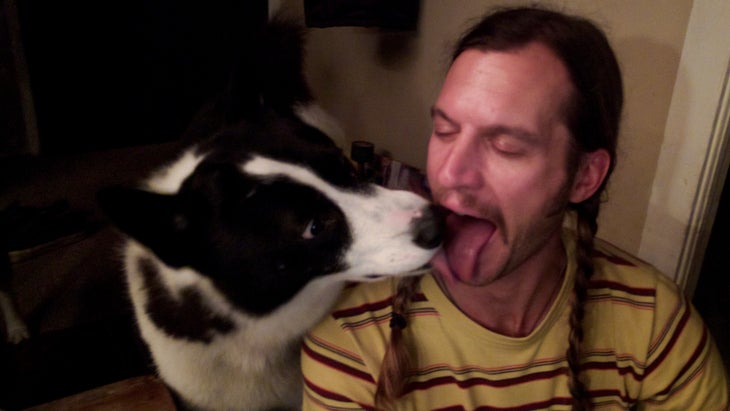
The Numbers
In the run-up to Boulder’s Voice and Sight program, animal behavior scientist studied the behavior of dogs in the area. His two papers on the subject are probably the most thorough studies ever conducted on the impact of dogs on their environment.
The studies’ conclusions? “Behavioral data showed that off-leash dogs generally did not travel far off-trail, that when they did it was for short periods of time, and that they rarely were observed to chase other dogs, disturb people, chase wildlife, destroy vegetation, or enter bodies of water … people are more disruptive to the environment than dogs … the well-being and interests of dogs should not be summarily and dismissively be compromised when dogs and people attempt to share limited space.”
“It’s people, not dogs, who are the problem,” Bekoff told me over the phone. His study backs up that conclusion. Even in surveys administered to non-dog owners, the general opinion overwhelmingly indicated that it was people, not dogs, destroying vegetation, littering, disrupting bodies of water, and causing problems with wildlife.
Following his 1995–96 study, “,” Bekoff delved into the issue of . At the time, dog harassment of prairie dogs was a local controversy. “We found that dogs clearly influenced the behavior of prairie dogs,” the study concludes. “However, no prairie dogs were found to be caught or killed by any dog during the course of the study.” That was while 12 researchers spent three months studying the issue. While prairie dogs were obviously observed to become more wary of dogs, no negative impacts of that wariness could be determined.
“Many more people reported seeing other people disturb wildlife (92.2%) … significantly more often than dogs (49.7%),” Bekoff’s paper states. In fact, his research indicates that only a small proportion of those people recreating outdoors in Boulder perceive dogs as an issue at all. Of non-dog owners, 10.6 percent felt that “there were too many dogs,” compared to 2.9 percent of dog owners in the study who expressed the same sentiment.
There is no statistical correlation between the presence of dogs and degradation of the ecosystem Bekoff studied. At least not one that is grossly outweighed by the impact of humans.
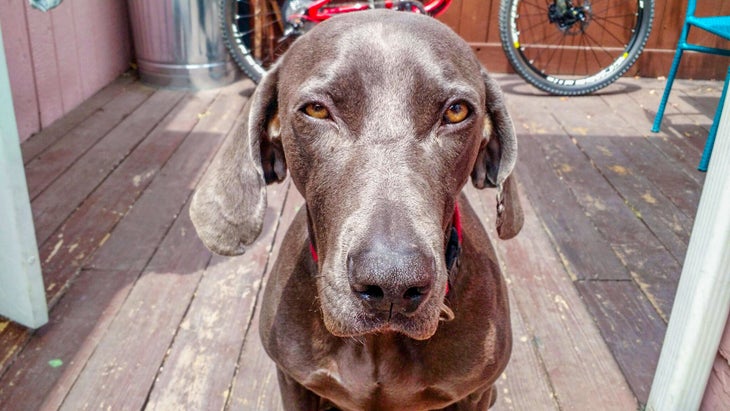
Why Off-Leash?
Talking through all of this with Bekoff, I asked if there was any overriding argument or compelling, simply communicated reason as to why dogs should be off-leash. Or why they prefer to be. “You have to remember that science didn’t consider dogs a serious subject for research until very recently,” he told me. “I’m not sure there’s anything numerical, but the anecdotal evidence is overwhelming. Refer to every study printed saying dogs improve human emotion. We benefit from having them around, and a happier dog means a happier owner.”
Bekoff had much the same answer when asked if dogs got along with each other better when off-leash. The answer is so obvious that it’s just never been studied. On a leash, dogs are restricted to a small area surrounding their handler, which the dog’s nature dictates it must protect. If another dog enters that space, it’s a threat. Off-leash, dogs are free to encounter each other and interact in neutral areas. Anecdotally, every dog I’ve ever seen has been friendlier off-leash. Any other dog owner or dog lover will tell you the same thing.
“All observers noted that dogs off-leash were friendlier than dogs on-leash, although no data were collected on this aspect of behavior,” states one of Bekoff’s studies.
Off-leash, in the outdoors, Wiley is able to satisfy his curiosity, make new friends, explore his surroundings, and just generally be himself. He’s free to spend as much time as he wants sniffing a butt or peeing on bushes. On-leash, he has to keep pace with me, which naturally limits a creature that is faster, more agile, and has more endurance than any human ever could.
Can you quantify the benefits of freedom? Can you apply statistics to free will? Can you measure the power of going outdoors? I think dogs would feel the same way about being able to run around and smell stuff that we would about being able to go for a hike. And, man, going for a hike with an off-leash dog is just great.
Wiley and I are a team. There is no situation that his presence does not enhance. Beach camping in Baja? If someone approaches my camp in the middle of the night, I’ll know about their presence before they know about mine. Bear canister? I guess the rules say I still have to carry one, so I do, but with a power of smell seven times better than a dog’s, no bear is coming anywhere close to somewhere they can smell Wiley. Burros eating your tortilla chips in Death Valley? Not anymore. On backpacking trips, Wiley will hang back with the slowpokes and sniff out the turns I’ve taken, miles ahead, keeping everyone on track.
My dog and I have a deep connection that’s rooted in doing stuff together outdoors. I can rely on him, and he can rely on me. We’re stronger, safer, and happier together. And I can enjoy the outdoors more significantly as a result. In fact, with a dog, I’m compelled to.
None of that would be nearly as powerful if I had to drag Wiley around on the end of a six-foot rope. A big factor is our mutual trust, as demonstrated by me allowing him to make his own decisions, off-leash. It makes him more confident and satisfied and gives him his own burden of responsibility. Would running after that thing make Dad happy? In Wiley’s mind, if it won’t, he won’t do it. But I do enjoy watching him chase stuff.
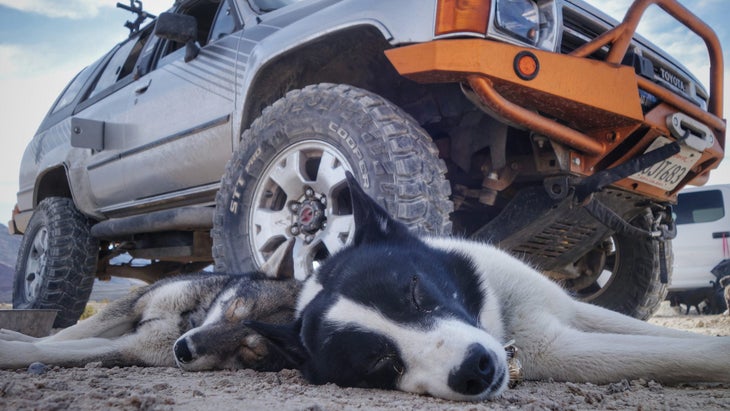
Responsible Dog Ownership
“I am a huge believer in enforcement,” says Bekoff, arguing that the best way to retain the privilege to walk your dog off-leash in a place like Boulder is to obey the rules—and have a reason to do so. “You need both the carrot and the stick to alter human behavior,” he continues. Having your dog off-leash means you need to be responsible.
There absolutely are places that dogs should not be off-leash, of course. And there are places dogs should not be at all. But there are also areas where human children should not be permitted to wander unsupervised and areas where humans should not tread at all. But just like laws that govern people are written to respect the decision-making powers of reasonable men, laws that govern dogs should also allow for the reasonable man.
I’m not about to let Wiley run amok in a sensitive bird nesting site or let him loose on a beach full of elephant seals. In fact, please give me a sign warning of those things. But on a backpacking trip, while camping, or just spending time in the mountains, I do want him to be off-leash. He’s happier that way, so I’m happier, too. And I don’t want that freedom to be limited by blanket legislation, personal prejudice, or fear.
It is the burden of any dog owner or caretaker to be responsible and considerate. Just like Americans traveling abroad, each of us is an ambassador for our culture. Every time someone steps in dog poop, that’s someone who’s going to thing negatively about dogs. Anyone who’s ever been bitten is going to feel even worse about them.
You know the saying “that’s why we can’t have nice things”? That’s how I feel every time I see a dog barking incessantly, every time I see dog poop laying around on a trail or sidewalk, and every time an armada of untrained chihuahuas attempts to kill Wiley. They never succeed, obviously, and Wiley is convinced they’re just playing, but a bad dog is the product of a bad dog owner. If you and I want to be able to take our dog places, then it’s up to us to make sure the dog is a positive thing, not a negative. There is no excuse: train your damn dog. And pick up his poop.
Want a real villain in this story of pets in conflict with nature? Domestic cats are reportedly killing in the United States and are solely responsible for the extinction of at least 33 bird species. It’s cats, not dogs, that are our real enemies.
